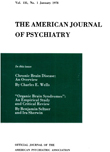ENVIRONMENT
Abstract
It has been demonstrated how even with a disciplinary activity as the environment, combat-induced emotional disorders will respond without any excess of psychiatric therapy, without group therapy, other than that afforded in group activities, and without special therapeutic measures. All that was required was to afford the individual reasonable security and understanding, have him accept his illness and give him a measure of insight into its dynamics. This has been accomplished in one comprehensive, intensive interview. Then, time (most men were present at least 3 months), the controlled, stable, adjustable environment, and infrequent follow-up interviews do the rest. The environment must be a stable one and no matter how constructively it is utilized and manipulated, it is fundamental to success that each subject receive a measure of individual treatment. Upon this individual psychotherapy hinges the best utilization of any stable environment which can only be a valuable adjunct.
Access content
To read the fulltext, please use one of the options below to sign in or purchase access.- Personal login
- Institutional Login
- Sign in via OpenAthens
- Register for access
-
Please login/register if you wish to pair your device and check access availability.
Not a subscriber?
PsychiatryOnline subscription options offer access to the DSM-5 library, books, journals, CME, and patient resources. This all-in-one virtual library provides psychiatrists and mental health professionals with key resources for diagnosis, treatment, research, and professional development.
Need more help? PsychiatryOnline Customer Service may be reached by emailing [email protected] or by calling 800-368-5777 (in the U.S.) or 703-907-7322 (outside the U.S.).



